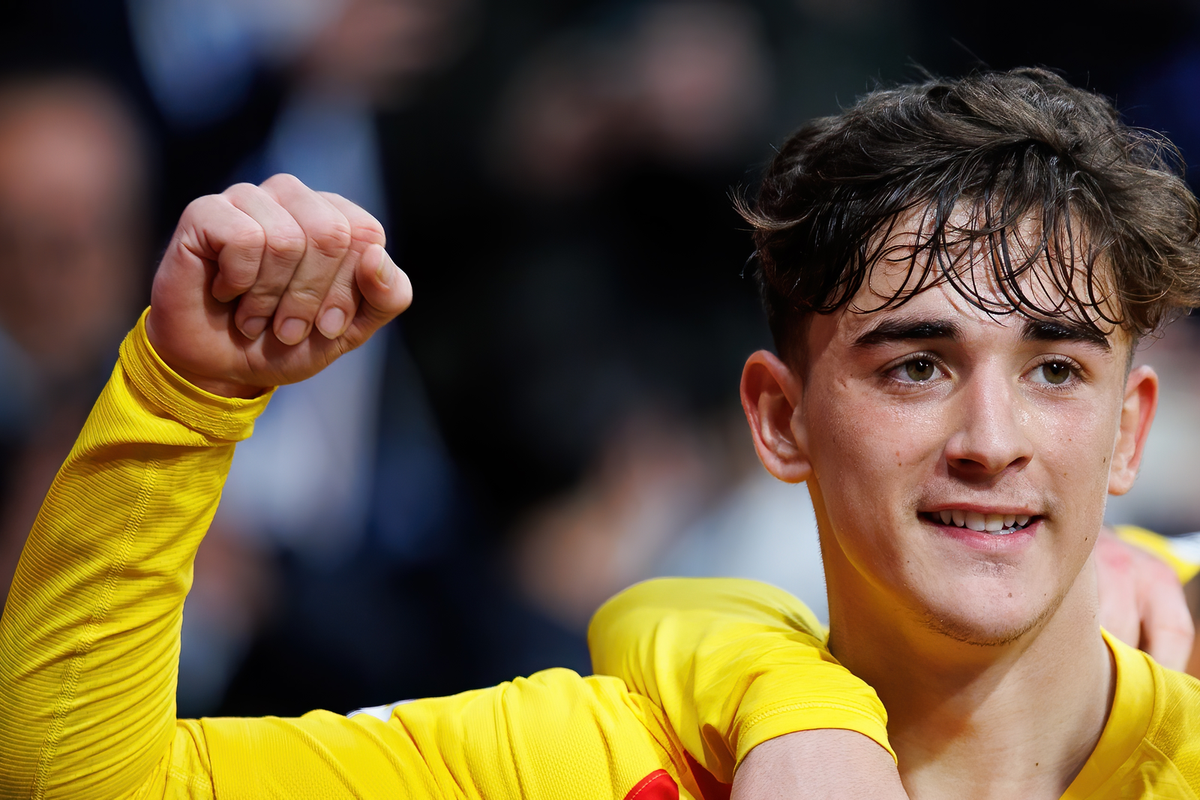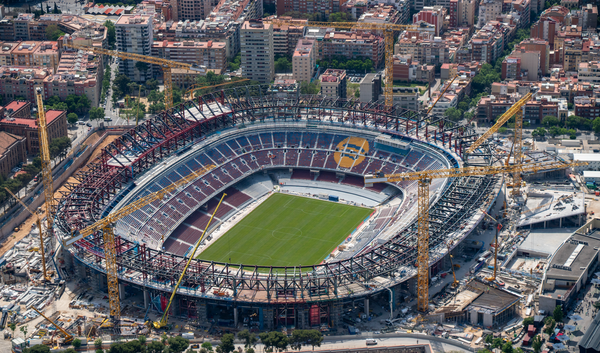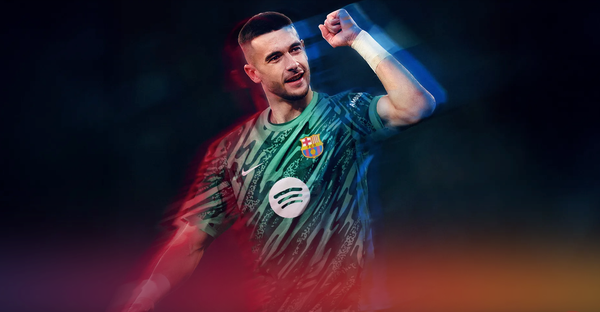Heartbreak at Montjuic: How Barcelona lost despite a dominant Clasico performance
Match review of Barcelona's loss to Real Madrid despite a dominant Clasico performance.

'I did not come here to lose these types of matches.' remarked Ilkay Gundogan in the post-game conference, visibly distraught following a defeat which could have and even should have been more—much more. Barcelona want to win every game; week in, week out, they run out onto the pitch with a single goal: to win. And Clasicos? Well, Clasicos are war more than they are football. And you don't want to win wars; you must win them.
Funnily enough, Gundogan is not a loud person; his calm, unimposing, soft-spoken voice would probably go better alongside a happy jingle about the new Camp Nou or in a TV commercial urging you to adopt a cute puppy from the shelter. But last night, his voice thundered across Catalonia and hopefully the dressing room too.
'I don't want to say anything wrong, but I was in the dressing room and there was disappointment, but to be honest, I would've liked to see more frustration and anger. There should be stronger feelings.' he continued, making it clear he's not going to settle for anything less than victory. And that's exactly the type of mentality Barcelona need.
Ice in their veins, eyes on the prize and nothing short of victory and dominance on their mind; sheer, unrelenting, unyielding and utter dominance. That's who Barcelona are—winners. And this Barcelona, Xavi's Barcelona, are winners too. Perhaps not ones to define an era, to mark a generation or to leave an everlasting legacy just yet, but they have the makings of such a team already.
Last night, a wonder goal and a deflected assist sealed a heartbreaking loss to Real Madrid who couldn't keep up with a relentless Barcelona for the better part of the first hour. The stats reflect that too: the Catalans had more possession, soaring as high as 63% at one point in the game while also having more passes, tallying 517 compared to Real’s 484. But even more importantly, they secured 1.42 expected goals, dwarfing their opposition’s 0.87.
This can be seen even more clearly in the graph above. Barcelona (blue) generated more xG across the 90 minutes than Real (green), despite the result. Of course, that doesn’t necessarily mean they were more threatening at all stages of the clash but when it came to chance-creation, they clearly had more opportunities to score.
And that’s not even it; Barcelona had more positional attacks with shots, more counter-attacks and more overall set pieces, signalling they were indeed on the front foot throughout most of the clash and across the phases of play. But crucially and somewhat disappointingly, they had fewer goals and also less luck.
So in a poetically harsh way, this game is perhaps the perfect portrayal of where Barcelona currently are and where Xavi is as a coach: close but not there just yet. Despite all of that, however, El Clasico was still - somehow - a largely positive experience. For 55 minutes straight, Barcelona were the better team and for 55 minutes straight, Xavi outcoached Carlo Ancelotti, a man who’s been in the managerial game in at least some fashion since the early ‘90s. Whatever you may think of Xavi and whatever you may think of Ancelotti, this is no small feat; quite the contrary, it’s a foundation worth building upon.
But if that’s so, why did Barcelona lose? Was it Xavi’s inexperience? Were injuries and a depleted squad to blame? Was it Ancelotti adapting? Was it just rotten luck? Intriguingly, it was all of that. Those 55 minutes, however, or the entirety of the first half to be more specific, were an incredible coaching exhibition by Xavi. From team selection, adapting to the opposition, playing to our own strengths and the general approach to the game, Barcelona did everything right. And it showed.
Looking at the expected threat timeline above, we can see that this game was truly a game of two halves; Barcelona controlling the first half and Real completely dominating the second. At the culmination of their domination were both of the goals, the first one entirely shifting the tides of the clash. But Barcelona could’ve and should’ve done more with their domination. That's the crucial difference between the two: one needs to generate a lot to gain little while the other can generate little to gain a lot.
Xavi opted for a three-man backline to combat Real Madrid’s transitional power and push Ronald Araujo closer to Vinicius Junior. Once again, this worked wonders as the Brazilian struggled to deal with the Uruguayan for the entirety of his time spent on the grass of Montjuic. Subsequently, Xavi still decided not to drop Joao Cancelo, instead, pushing him higher in a right wing-back/right winger role with freedom to invert into midfield and help retain and control the ball. Alejandro Balde was the width-holder on the opposite side and with Joao Felix’s inward movement, the young La Masia prospect was given more freedom to push up, pinning Federico Valverde in the process.
But it was actually the midfield that completely swung the game in favour of the Catalans; the double pivot of Ilkay Gundogan and Gavi outclassed their counterparts, weaving the web around them for the entire first half of the clash. Real Madrid tried to mirror Barcelona’s 3-2-5 with variations of a 4-1-3-2 and while it did give them some results at certain points in the game, the Catalans controlled the match comfortably. The main reason for that was the huge disconnect between Real’s high-pressing unit and their deep defensive line. Barcelona would regularly instruct Fermin Lopez to drop so they could achieve numerical superiority and then it was just a matter of systematically recycling the ball while they played around their uncompact opponents with what seemed like little to no effort.
And since both Carvajal and Valverde were regularly pinned by Felix and Balde respectively, Barcelona found it easy to create and access the free man once the ball had been shuffled from one side to the other. But the best parts of yesterday’s game came in the form of control; Barcelona were not compromising their control with forced verticality nor were they rushing into a suicide press whenever Real Madrid were building up from the back. Instead, the likes of Gundogan and Gavi would break the opposition’s gegenpressing and then retain and recycle the ball calmly; they had all the tools to do so while also enjoying a lot of space and time in the middle third due to the superiorities we discussed earlier. Gundogan even kept signalling everyone to slow down once the ball was firmly at their feet. And the result? A goal up from the seventh minute onward, two posts hit and several promising chances created. But it wasn’t enough. If you dominate Real Madrid but don’t finish them off, their resurgence is almost inevitable.
As much as we’re quick to blame Xavi for the shift in momentum in the second half, the plaudits need to go to Real Madrid and Ancelotti’s tactics. The introduction of Eduardo Camavinga and also Luka Modric helped wrestle control away from Barcelona while the former ensured more defensive solidity as well. Since the Catalans were defensively solid, they were forcing Real Madrid into long shots across the first half and the beginning of the second. Vinicius, in particular, was tightly marked with Araujo not leaving his sight. Barcelona’s control and a compact 3-2 setup meant Real couldn’t access their runners and Vinicius could mostly only receive the ball to feet and in unfavourable positions. But long shots proved fruitful after all. Aurelien Tchouameni tested Marc Andre ter Stegen at certain points in the game but Jude Bellingham cracked the German’s armour with a thunderbolt from distance. The shot, while certainly incredible, was also similarly saveable. Unfortunately for Barcelona, however, it took everything from them and gave it all to Real Madrid.
The momentum had shifted and the Galacticos were now in firm control, tightening the noose and gaining territory with every attack. Minutes after Bellingham’s goal, Barcelona registered their lowest possession of the game, standing at a humble 37%. The tides had successfully been shifted and after Ancelotti’s retort to Barcelona’s dominant first half, it was Xavi’s turn to respond. But looking at the bench, his only options were a medicated Robert Lewandowski, a still not physically sharp Raphinha, a struggling Oriol Romeu and a bunch of kids. The pressure was on, the team were fighting a losing battle and when Xavi turned around to the bench, he was crushed by reality: Barcelona were in a war against their biggest rivals and they had brought a knife to a gunfight.
Whereas Ancelotti’s substitutes helped push Real Madrid in the right direction, Xavi’s pushed them in the opposite direction. Partly, perhaps, he was to blame too; while there is some sense in playing a still recovering and very much one-footed Raphinha with a heavy angle bias on his comfortable right winger spot, mixing things up with Lamine Yamal, your clearest difference-maker and best dribbler, on the left in a Clasico of all games is… Questionable. Romeu and Lewandowski didn’t help either. The former couldn’t keep up with the intense sustained pressure by Real and the latter’s heavy touches and lack of mobility meant Barcelona lost outlets to escape the ring of fire their opposition had been building up until that point. Control had been lost even before the substitutions were made but those subs were more like fuel to the flames rather than water they so desperately needed.
At the end of the day, there was a number of lessons we could all learn from a single game: the first half painted the way to success; Barcelona are a team built for technical excellence and once they are also coached for technical excellence, like we’ve seen in those first 45 minutes against Real Madrid, long-term success will be just a matter of time. That is the foundation to build upon. A Clasico loss hurts more than most defeats in football but a Clasico loss is also just that; a three points in a 38-game season, a 90 minutes in thousands we’re yet to play and a drop of water in an ocean. Another lesson is the lesson in mentality. Yes, Barcelona crumbled in the final half an hour of the game but while we can still question their defensive awareness, compactness or even tracking, mentality should not be on that list.

This is a team that’s willing and capable to dig deep and fight until the game is won. But to echo Gundogan’s words, we need more of them to show that passion, that fire and even that anger. It’s not enough to take solace in the fact we were the better team if that same team couldn’t win when everything was said and done. The players are young and they can still learn how to properly compete.
And that applies to Xavi as well - he is still green too; his in-game management needs refinement and while making subs to freshen up the team is a must, you also have to think whether those subs will break the cohesion and dynamics of the squad that’s already out there playing. Of course, quality depth and fitness are also paramount; this squad is simply too incomplete, too thin and too injury-prone to sustain greatness for a full 90 minutes, let alone an impeccable season. Whether we like it or not, finances will play a big part in that too. The landscape of football is drastically changing and Barcelona need to adapt to survive. Are their current struggles inherently linked to the dire financial times they’re currently experiencing? If so, what should our approach to competent squad building be?
All of that needs answering at one point. For now, however, we need to focus on the squad Xavi has and the cards he’s been dealt. We may have lost the battle in this El Clasico but the foundations to win the war are already there.
You've not seen the last of this team just yet.
Visca el Barça




